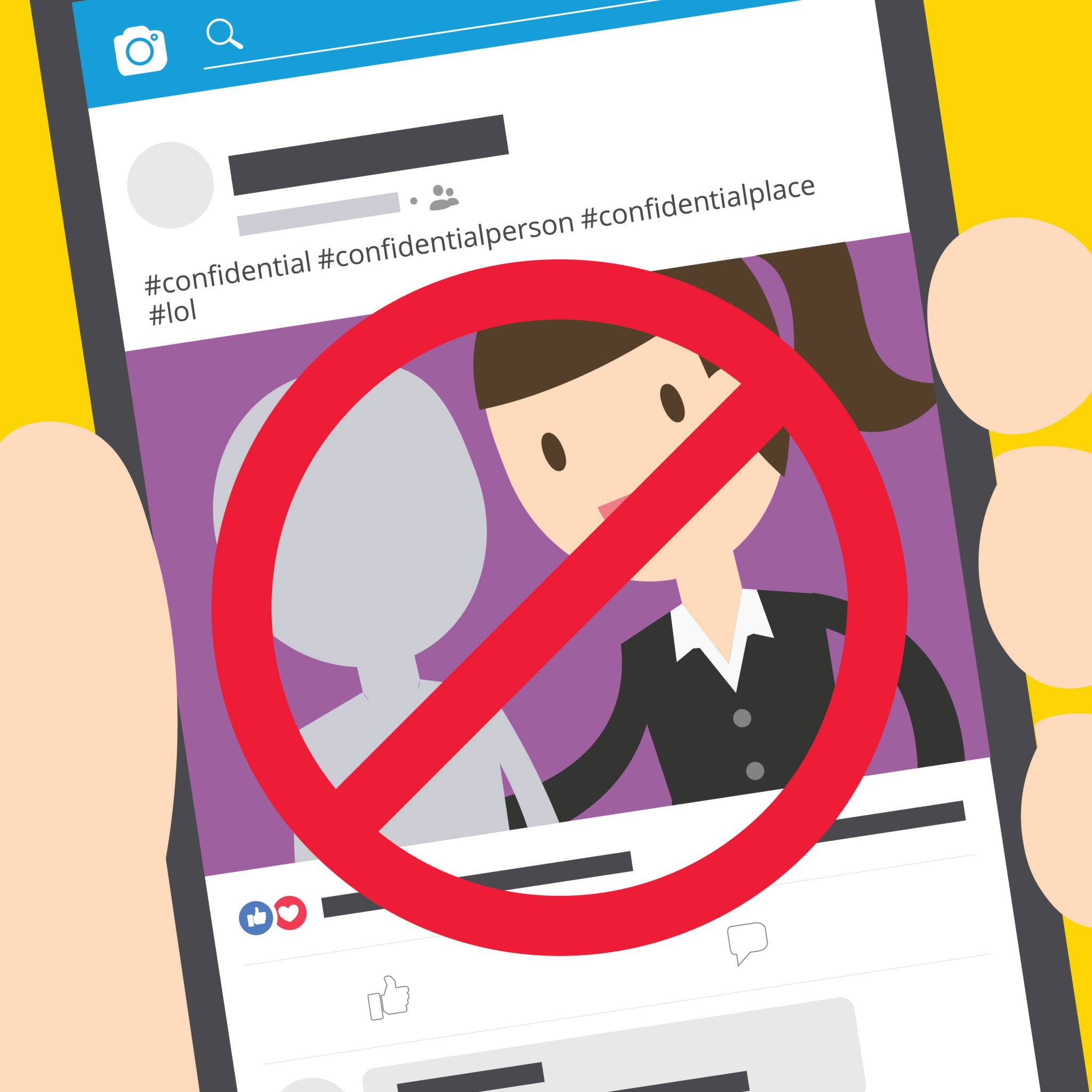My Company, Myself, and Social Media… Am I Doing This Right?

The other day I saw an ad for a company that my parents’ friend works for. Instead of seriously paying attention to the ad, I started thinking about that person. I realized that I completely associate that brand with my perception of that one individual. Hmmm.
My dad works for a well-known, global corporation with thousands of employees; yet, I wonder how many people just associate that massive corporation with “the neighbor with the cool Christmas decorations”? Has someone thought, “I’m going to pick this brand over other brands because I like my friend/cousin/neighbor who works there and is positive about it?” I can undoubtedly say yes because I’m pretty sure I’ve done that myself. Also, I have to admit that I trust the people in my life’s experiences with a company, brand, or product more than anything I may read online from strangers.
As someone who works in marketing, this really got me thinking. When I go to ShopRite with my reusable Colliers Engineering Green Team grocery bag, a potential client may see me and judge my company on my behavior. And when someone is driving one of our logoed vehicles, that person’s driving will reflect back on the company. When I talk about my company with friends and family, those people are listening.
Of course, the most permanent and far-reaching way to represent your company is to have a social media account.
I turned to Alejandro Patino and asked what he thought about this. Why Alejandro? I was scrolling through LinkedIn and noticed his post about the half-marathon he ran wearing a Colliers Engineering & Design shirt for the race and in the pictures. So, not only did the people there at the marathon see him, but now countless people online will see him representing our company online. Why does this matter?
Guilty by Association
 On your social media accounts, you represent the company you work for. Even when you aren’t posting an image of you wearing a shirt with your company’s name on it. Everything I post online says something about me. If I were to post a wild picture, it would inform the way my friends and family who follow me would see me. And by extension, that would inform the way they think about my company. They may think, “oh wow, that company hires really irresponsible people, I don’t know how much I trust them with my business.”
On your social media accounts, you represent the company you work for. Even when you aren’t posting an image of you wearing a shirt with your company’s name on it. Everything I post online says something about me. If I were to post a wild picture, it would inform the way my friends and family who follow me would see me. And by extension, that would inform the way they think about my company. They may think, “oh wow, that company hires really irresponsible people, I don’t know how much I trust them with my business.”
When Alejandro Patino ran a half marathon wearing his Colliers Engineering & Design shirt and posted about it on social media, I immediately knew he must be determined and disciplined, which are great traits to associate with our company.
He was aware of all of this when he chose to wear the shirt and chose to post about it. He said, “During one of our monthly department meeting, I was chosen to present during the Core Value minute, and I talked about how professionalism isn’t just the work you do, it’s how you represent us through your behavior, how you treat people, and the ways you choose to express yourself.”
Posting About Work: What Not to Do
There are some obvious no-no’s when it comes to taking pictures about work: don’t be inappropriate, racist, sexist, don’t post pictures of you breaking rules, not following safety procedures, etc. But beyond the obvious things to avoid, what else should I keep in mind?
At an engineering firm, it’s extremely important to remember that some clients and projects are confidential. That means no selfies from a confidential location or tagging confidential clients or linking to them through hashtags. That may seem obvious when posting from an official company account but remember that everything you post on your private account represents the company as well.
And you might be thinking, oh none of my followers are even in the industry. But platforms like Facebook are fickle with what they show to who. Sometimes people are shown things that their friends “like” even if they aren’t following the original author.
Alejandro said, “Don’t complain about anything online, especially anything work related. If you don’t like the way your coworker’s perfume smells, posting about it online is definitely the wrong move. Similarly, sometimes people post things that are too emotional or personal and it’s awkward to read.” You probably want to avoid treating your followers and connections like they are your therapists.
Posting About Work: What to Do
On the flip side, there is a lot of good that can be done for a company on social media. Posting (non-confidential, obviously) work-related projects and articles on your LinkedIn, for example, can be very informative and help your contacts learn more about what you and your company do. Did you write an article? Get a new certification? Make sure to update your LinkedIn regularly with new achievements.
Posting interesting pictures and articles that enable you to show your personality and specific interests can also be worthwhile. Alejandro said, “Posting about the race presented a positive, non-work-related topic to bond with coworkers and industry leaders with over. Those strengthened relationships or friendly comments may not seem important now but could become helpful connections in the future. For example, a future client may comment about their love of running on my post, and we might start a rapport now that will turn into a trust-filled professional relationship later on.”
 Consider Your Audience
Consider Your Audience
One caveat he noted was to say, “When I post online, I always consider who my audience is. Then I only post things that I know won’t offend them. I’m not going to post a shirtless picture, or something political or negative. I try to purposefully post positive, interesting things that add to the conversation online.”
One other major piece of advice he had was, “Always ask everyone in the picture if they want to be a part of the post even if the picture comes from a company event. If someone doesn’t like the angle or the way the wind was blowing their hair, they might not want the picture up at all, or maybe they might just ask not to be tagged/named. Always make sure everyone in the picture you want to post has given full consent for whatever the end result is.” Good point. If they say don’t post, no matter how much you want to post it, just don’t.
What Else is Social Media Good for?
Social media can be used as a tool to find new ways to improve professionally. Whether it be reading about industry news on Linked In, or following engineering accounts on Instagram, social media can be a handy way to easily access engineering information from around the globe. What are they doing with BIM technology in Norway? What does SUE technology look like? These questions and more can easily be answered by following strategic accounts on all platforms.
A specific tip for LinkedIn (though Facebook has these in some capacity as well) is to join groups. I am a part of a few PR/marketing-related groups, and they exist for every niche in the industry. Are you an environmental engineer looking to learn more from peers from around the world who share your interest? These groups are free to join and connect you to people you’d otherwise never meet, again enabling you to more easily access the latest industry news, participate in discussions about trends and happenings, and learn from other engineers.
By Platform
Best for: images and videos of job sites and scans
Best for: News, links, following municipalities, companies, and individual industry leaders, and live tweeting at events and conferences.
Best for: News, links, following (“liking” the page of) municipalities, companies, and individual industry leaders, as well as joining “groups”
Connecting with coworkers, peers, industry leaders, companies you’re interested in, and sharing news and links. Also, remember that your profile can be thought of as a “live resume” that should routinely be updated and added to.
Podcasts
While this is more social media adjacent than a direct platform, they are a great way to hear in-depth discussions from experts on all the engineering topics you want to learn more about.
Some great ones include
Engineering Management Institute
Youtube
More than just how-to-build-your-new-cabinet, this platform is great for long interviews, sharing webinars, and showing video footage of project sites and interesting technologies.
Ok, I’ll let you go explore some of the links I just gave you (you’re welcome) and I’ll catch ya the next time I ask, “Am I Doing This Right?”

Comments are closed.